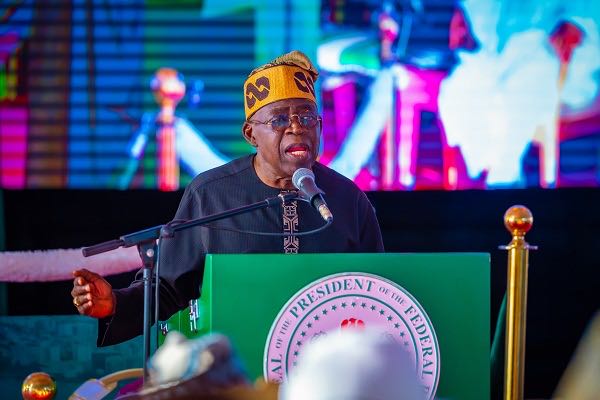The Growing Concern of Misinformation in President Tinubu’s Speeches and the Problem of Inadequate Data

BY: Mustapha Lawal
One would expect that the presidential address, especially on symbolic occasions such as Independence Day, would offer citizens a clear, factual, and straightforward representation of the country’s state of affairs. In President Bola Tinubu’s case, however, it seems that each address is riddled with exaggerated claims, unclear figures, and controversial assertions, making it difficult for the average Nigerian to separate fact from fiction.
Take his latest Independence Day speech, for example, where the President asserted that his administration had secured “$30 billion in foreign investments” within a short span of time. This claim has been debunked by several fact-checking organizations, revealing that the numbers were not only inaccurate but entirely fabricated in some instances. FIJ’s report on the speech exposed the glaring discrepancy between what was stated and the actual data, highlighting that there was no evidence of such investment inflow into Nigeria during the period Tinubu referred to.
The issue here is not just that these exaggerated claims exist but the context in which they are delivered. At a time when many Nigerians are grappling with economic hardship, inflating figures like foreign investments, job creation, or economic growth does nothing to restore public trust. Instead, it adds to the growing disillusionment with a government that appears increasingly out of touch with the realities on the ground. Even Dubawa’s fact-check report pointed out that several of the major claims in his Independence Day address were either poorly framed or lacked the necessary context, leaving Nigerians confused rather than reassured.
Looking beyond the Independence Day speech, President Tinubu’s other addresses to the nation have exhibited the same troubling pattern of miscommunication, exaggerated claims, and a lack of clarity. His speeches during critical national moments like the #EndBadGovernance protests, as well as his inaugural address, have been scrutinized for their accuracy, with many finding gaping holes between his assertions and reality.
In his nationwide broadcast to Nigerians amidst the #EndBadGovernance protests, Tinubu sought to quell the rising discontent about hunger and economic hardship. However, fact-checkers quickly pointed out the inaccuracies in his speech, especially when he claimed that his administration was already making significant strides in improving Nigerians’ livelihoods. FactCheckHub examined these claims and found that while Tinubu boasted about securing investment and progress in food security, the realities on the ground indicated rising inflation, worsening poverty rates, and widespread food insecurity. The president’s assurances did little to address the legitimate concerns of Nigerians, further alienating a populace already disillusioned with the government’s inaction.
A closer look at Daily Trust’s analysis of Tinubu’s hunger protest (#EndBadGovernance) speech highlights that many of the economic solutions touted by the president were not new policies but repackaged old strategies that had yet to yield results. This creates a recurring theme in his speeches: the over-promise, under-deliver narrative that has left many citizens sceptical of his government’s capacity for real change.
Furthermore, President Tinubu’s inaugural address in May 2023 set a tone that many hoped would be indicative of bold leadership. However, the sweeping claims made during this speech—particularly about Nigeria’s economic stability and prospects for growth—have proven elusive in their accuracy. BBC’s analysis of the speech showed that many of his promises, including energy subsidies, were either delayed or had little immediate impact on alleviating Nigeria’s pressing economic woes. As his presidency progressed, the disconnect between his words and the lived experiences of Nigerians became even more pronounced.
A key issue that amplifies this problem is the lack of data transparency. Without a robust and reliable data system, many of Tinubu’s claims cannot be independently verified. This was apparent when Africa Check and TheCable both analyzed his economic claims during the Independence Day speech and found them either highly exaggerated or lacking supporting data. For example, when Tinubu claimed that Nigeria’s economy was on the rebound and the path to recovery, many questioned the basis of this assertion, especially considering the rising inflation and unemployment that plagued the country at that time.
Tinubu’s hunger protest (#EndBadGovernance) broadcast followed the same script of vague promises. He cited successes in areas where Nigerians felt the most strain, such as fuel prices, without giving clear, actionable solutions. This gap between rhetoric and action fosters a climate of mistrust, especially when public officials fail to explain their actions in simple, transparent terms. The Jide Ojo piece for Punch calling for a fact-checking of the speech also pointed out the confusion caused by the president’s assertion that certain reforms were already taking effect when, in fact, no clear evidence supported those claims.
However, this problem goes beyond mere inaccuracies in speeches. The heart of the issue lies in Nigeria’s inefficient robust data system. Without a reliable and accessible data framework, it becomes nearly impossible for the average Nigerian to verify the government’s assertions. Many citizens are left to rely on members of the government statements and figures, trusting that these figures are true because there is no way to easily fact-check them. This absence of a proper data system fosters an environment where misinformation thrives, making the government’s claims more difficult to challenge.
In the absence of verifiable data, Nigerians are forced to depend on vague, and often contradictory, statements from the government. This was evident when President Tinubu claimed that his administration had successfully “secured the future” of Nigerians through bold economic reforms, even as inflation surged to an all-time high. These contradictions between reality and rhetoric leave many questioning the authenticity of what is being said.
As an administration, Tinubu’s reliance on ambiguous and often misleading information damages his credibility. In an era where public trust is already in short supply, particularly after the controversial elections, this trend of misinformation only fuels greater scepticism among Nigerians. This crisis of trust becomes particularly dangerous when the population feels alienated from their leadership. Nigerians need clear, transparent communication—something Tinubu’s speeches have consistently failed to deliver.
The implications are severe. When the president’s words can no longer be trusted, public discourse is derailed. Citizens are left to either believe in false hopes or reject leadership altogether. The lack of clarity and the constant need for fact-checkers to unravel the truth from his speeches erodes the public’s faith not just in Tinubu, but in government institutions as a whole. This trend also sets a dangerous precedent for future administrations, where vague promises and half-truths become the norm rather than the exception.
If Nigeria is to recover from its economic and social challenges, the president’s addresses need to be based on verifiable facts and actionable policies. Otherwise, it risks continuing down a path where misinformation undermines the very foundation of democracy. There should be accountability and a reliable data system that enables Nigerians to measure the actual impact of government policies, free from misinformation. Until then, Nigerians remain trapped in a cycle of exaggerated claims, unverified statistics, and unclear assertions that dominate their political discourse, leaving them with little more than blind trust in government.




